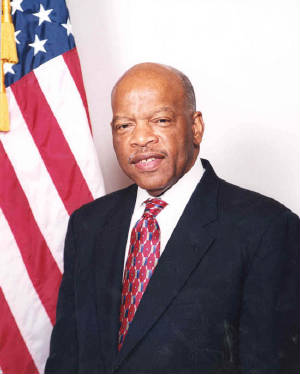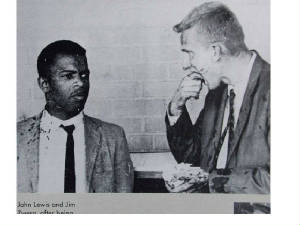|
|
Activist and Democratic Congressman John Lewis of Georgia showed support for gay marriage Tuesday, in an interview with Palo Alto High School teacher David Rapaport. The interview recorded by Rapaport was originally planned for Sept. 16, [2009] but was postponed as Lewis was called to the House floor to vote. For the nine-and-a-half minute duration of the interview, the two discussed the civil rights era and the state of civil rights now. "We must keep in mind that we are one people," Lewis said during the interview. "We're black, we're white, we're Asian Americans, we're Latinos, we're Native American, we're gay, we're straight, but we're one people." The interview was cut short when Lewis was asked to appear on the floor [of the House of Representatives] to vote. This story was originally published by Zachary Stanton-Savitz of the Paly Voice.
John Lewis was nearly killed by segregationist forces when he attempted to walk across the Edmund Pettis Bridge in
a now infamous incident of racial intolerance. Here he appears with Jim Zwerg, with whom he shared horrifying moments as mobs
of white racists set upon them as they attempted to integrate transportation facilities in the South as part of the Freedom
Riders campaign.
.
Danny Glover Reads John Lewis' Speech In August of 1963, John Lewis was at the forefront of the American Civil Rights movement. He wrote remarks for
a speech given immediately prior to those of Dr. Martin Luther King at the Lincoln Memorial which were severely edited and
the original speech bore little resemblance to what he eventually delivered. He chose to compromise. Actor
Danny Glover reads his original speech with an intensity that brings out great passion and depth.
.
John Lewis describes his brutal treatment in the short clip below.
|
|||||||||||||||||||||||


